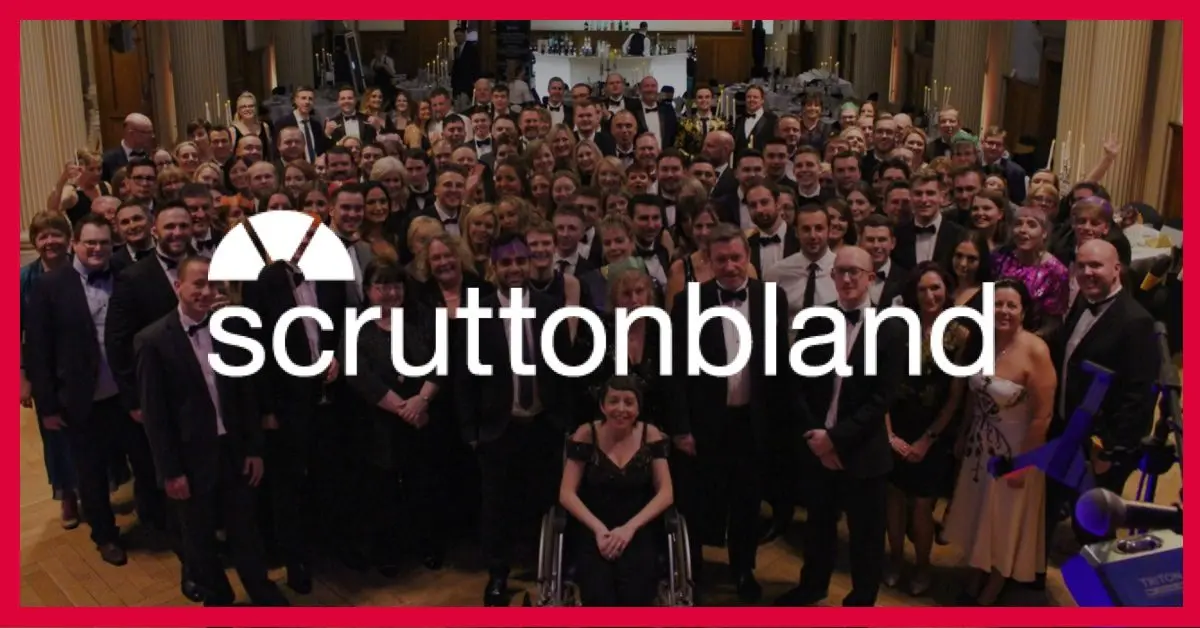In this edition of Firms in the spotlight, we spoke to Scrutton Bland s to learn some more about the founders behind the firm and how they juggle their work and family life.

Scrutton Bland are an accountancy practice located in the South East of England. They operate out of four offices and provide accountancy, tax, insurance and independent financial planning advice to both business and private clients. We met up with Nick Banks, Business Advisory & Cloud Accounting Partner, to find out a little bit more about the firm and the cloud services that they offer.

Nick Banks Business Advisory & Cloud Accounting Partner
Background
It would be great if we could start by finding out a little more about Scrutton Bland and the services that you offer.
Yes, of course. We have over 200 employees across four offices in four different East Anglian counties – Colchester, Diss, Cambridge and Ipswich.
The firm has a multi-service offering with Business and Tax advisory at its core, but with other services such as Insurance and Financial Planning which are substantial parts of the business. Our Insurance department is a notable addition to our portfolio of services, that sets us apart from our competitors.
We have standard services such as Accounts and Tax compliance, Outsourcing and Audit, but we also differentiate with Corporate Finance, Internal Audit and our new Systems Advisory Service. About half of all the staff work in the Accounts and Tax business.
The firm was set up in 1919. Do you consider yourselves a more traditional firm?
I guess that depends on what you call traditional. We like to think we provide a safe and steady pair of hands that business owners can rely on, but we are definitely not static. We consider that one of the reasons we have expanded over the years is because we have evolved with the times.
We try to pioneer our approach, with a heavy focus on technology and how that enhances our services, as well as developing a supportive and nurturing culture. Our approach focuses on being a “Critical Friend” for both our clients and employees, providing support but also an honest critique to help them get the most out of themselves.
You have a number of farming and agricultural clients – is this your main sector and your core niche? Have you any other dominant sectors across the firm?
Agriculture is one of our main sectors but we have several others. We are lucky enough to have a number of Partners and Directors with individual specialisms that help us support clients to a greater depth.
My focus is Agriculture but some of our other sectors include Technology, Education and not for profit.
Technology Services
You offer both Cloud Accounting and Systems Advisory services to your clients. Are these quite new service offerings and how do they differ?
Our Systems Advisory service is new, and was launched just over a year ago, but our cloud accounting offering is five years old.
We were relatively early pioneers in this area with our cloud accounting service, sblive, which is focused around providing live business advice by utilising cloud technology. sblive generally had Xero at its core but we also use Receipt Bank and Futrli. The service has transformed over the years as technology changed but the core mandate has remained.
Our Systems Advisory Service was initially developed in order to support our clients in becoming Making Tax Digital compliant, but again has grown as we quickly identified more ways to harness the possibilities of efficiency gains for businesses through adopting cloud technology. We now help businesses transition to purely cloud based operations where it is of benefit to them.
How important do you think technology-based services are in your firm both now and in the future?
I think we are at a stage where all services are technology-based. This does not mean they need to be fully automated, as we believe our greatest attribute is the quality of our advisers, but that tech is used to improve or accentuate our services across the board.
Nothing made this more apparent than when the first pandemic lockdown hit, as with limited disruption to our services, we could quickly transition to flexible and remote working and service provisions. This smooth and efficient shift highlighted to us how well we had embedded technological support throughout our enterprise.
Nothing made this more apparent than when the first pandemic lockdown hit, as with limited disruption to our services, we could quickly transition to flexible and remote working and service provisions. This smooth and efficient shift highlighted to us how well we had embedded technological support throughout our enterprise.
Do you have a specific team delivering the Cloud Accounting and Systems Advisory services? Do they only work in these service lines?
Our aim is to make cloud accounting the backbone of all our Business and Tax Advisory services, and on this basis, it is used throughout this part of our business. The Systems Advisory Service is a more focused service with a niche skill set and so has been set up as a separate department to enable specialisation. There is some crossover to enable skill sets to be maintained but there is a distinct separation now.
The Systems Advisory service line is a really exciting area for accountancy today. What have been the challenges when setting up this service? Was this a change in the firm’s strategic direction in response to market needs?
In reality, this came out of a combination of necessity and opportunity. Our Business Advisory teams were repeatedly being dragged into providing software support, training and even implementations. This was inefficient, provided varying levels of service and often distracted our team from their main work.
As a result we hired someone with experience in this area and supported them in developing a strategy for a self-sustaining service. Once this strategy was presented it was unanimously supported by the Partner group and the department has grown from an initial small team of two to now four full time employees.
Recruitment has been a challenge, but support has been provided internally as we see this as a great opportunity for the firm.
What specific services does the Systems Advisory Service line offer?
The four key services are –
- Advisory – guiding clients towards the best cloud based systems for them to use
- Implementation – managing the transition of the client system and data
- Training – tailored training on the software and
- Support – ongoing phone and email support.
Have you any examples of some of the Systems Advisory projects you have completed. Are these new clients or has the work come from your existing client base?
The majority of our work to date has been for existing clients or relatively new clients to the firm who can see the value in a system review. As the service is still relatively new and processes are being tweaked, the initial roll-out has been tempered to ensure the level of delivery is consistently high.
We have assisted clients over a range of industries including but not limited to: not-for-profit, Marketing, Hospitality, Retail and Healthcare. All of these projects have been full service from advisory through to support and normally results in 5-10 app recommendations and implementations, staggered over time.

The Team
Can you tell me a little more about the structure of the cloud teams?
Our cloud team is the same as our Business Advisory team and so all have a strong accounting background.
Our Systems Advisory Service team is separate but again they all have accountancy training. This is our USP – a key objective of our service is to improve business reporting and we have found that the best people to understand the needs of businesses and deliver results in this area are accountants.
Do you see this service line growing in the future and it becoming one of your main areas of recruitment?
The strategy for our systems team includes rapid growth over the next couple of years and the structure of the team has been designed to enable this to happen. We believe that the need for this service will increase rapidly over the coming years and we are looking to position ourselves to maximise that opportunity.
The Technology
Do you have a core app stack for clients that you operate across the firm?
We had a core appstack for our sblive service initially, which was Xero, Receipt Bank and Futrli. It wasn’t a mandatory appstack as we worked with the other software but those were the ones we referred our clients to install.
With our Systems Advisory Service, our premise is to be software agnostic and on that basis we refer apps based on their specific functionality. That said, we generally find that we come back to Xero and ApprovalMax due to their versatile functionality and the options they present. We used to refer Receipt Bank a lot but AutoEntry is now featuring more prominently.
With a larger firm like Scrutton Bland you have clients from a range of industry sectors. Does this make it tricky when it comes to selecting the suitable technology?
Anything industry-specific gets focused through our Systems Advisory team unless it is agriculture where our Agri team takes the lead. We have refined our approach to mapping our clients’ process, data and reporting needs as well as how we carry out research on their systems and document our findings. This process enables our service to work across any industry or sector.
We also work with external consultants in specific areas that are highly complex. There are always lessons to be learned when recommending a new piece of software and we have had our fingers burnt a few times but that is to be expected when trying something new.
You have partnered with Figured which is an application for the agricultural sector – your niche sector. Why did you decide to partner with them?
Agriculture is a key sector for us and it was a strategic decision to identify a software solution to enhance our cloud accounting service to our farming clients. The Figured team are great to work with and we were early adopters so had input in shaping their product for the UK market.
There was significant investment on our side but this is now paying off with a deep understanding of how and when to use Figured, which we are seeing pay dividends.
How easy has it been to roll out Figured to your existing clients and what have been the main hurdles that you have encountered?
Our first step was to summarise the software packages our farming clients used and segment those clients based on software used and how effective it was. Some are resistant to change but we identified a number who welcomed cloud and wanted to get better insight from their accounting data. Getting comfort with Xero and Receiptbank was the first step before Figured is deployed. We then encouraged feedback from our clients on their user experience.
Events and demonstrations help, listening and talking is even better. No one should expect that an app will work out of the box and that it will work for all businesses. It is about understanding the problem, and finding the solution that solves that problem, not forcing software onto a business that isn’t ready for it.
What are the key metrics that you use in order to monitor the progress of the Systems Advisory Service line? What changes have you made as a result?
The first metric was to separate it as a distinctive service line to enable internal reporting. Otherwise the KPIs are relatively straightforward: Projects won, Projects delivered, Fees, Margin, Recoverability, Pitch success rate, Internal referrals. The other main metric is return on investment as we understood that initially the department would be loss-making whilst it developed its team, marketing and processes.
The Future
What do you think will be the biggest challenges for accountancy firms over the next 5 years? Do you think they will need to recruit specialists in the tech arena?
Adaptation is the key to progress. The value of compliance work will diminish as businesses are looking for more from their advisers. Technology has caused this to happen, but technology can also help solve it. Being brave, taking the leap and persisting in a period of change will be the biggest challenge.
Some have already recruited tech specialists, some will do so, but most won’t. It really depends where the firm wants to go. You can still provide a great accountancy and business advisory service for clients without focusing on tech. But if you do want to specialise in tech then longer term you will most likely need people with IT skills to help enhance functionality and keep you ahead of competitors.
Where does Scrutton Bland want to be 5 years from now?
Simple answer is to approach our work as we do now: pushing the boundaries on what defines an accountancy firm and continuing to support our clients and staff. We are always looking to grow, but not at the risk of damaging our internal culture. We believe it is this approach that has enabled the firm to exist for over 100 years.








